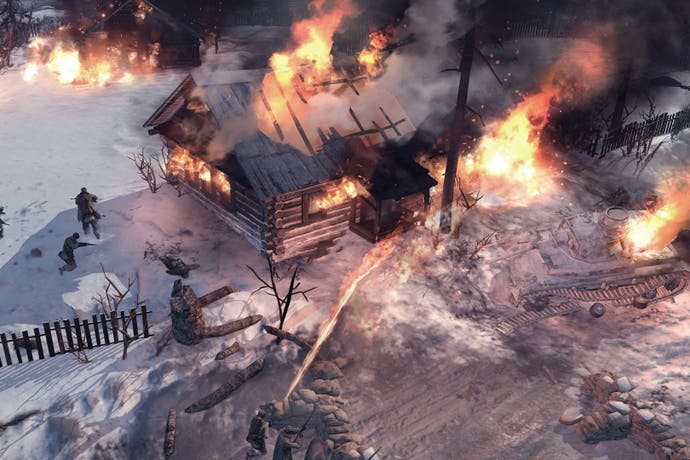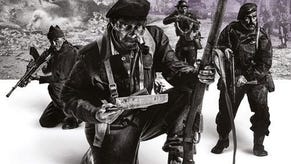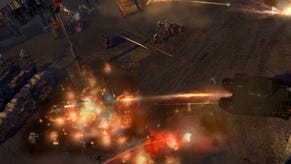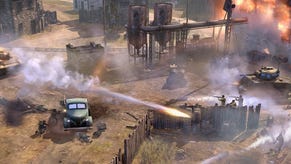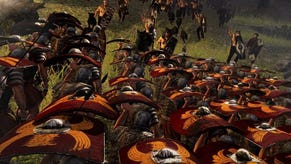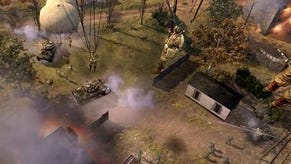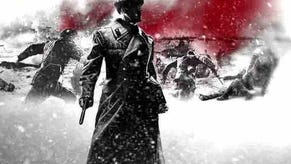Company of Heroes 2: how Sega's millions helped Relic's RTS get in great shape
"We'll get the game we wanted to get out."
A few hours after Sega bought Relic Entertainment, the Vancouver, Canada real-time strategy specialist whose fate had been up for sale thousands of miles away at the THQ bankruptcy session in Delaware, Company of Heroes 2's designers got back to work.
Game director Quinn Duffy and the rest of the development team were in the middle of what's called a "finaling exercise". Amid the uncertainty around the future of the studio, amid the chaos of the collapse of its publisher and owner THQ, all Relic could do was assume Company of Heroes 2 would be released. Indeed it had to - and soon.
It had been one hell of a busy Christmas. THQ's high-profile demise had been sniping at the developers' attention for months as Relic battled to get Company of Heroes 2 ready for release before the end of March 2013. "There was a strange mix of feelings on the team because we were all a little bit nervous about what was potentially going to happen," Duffy tells Eurogamer in the basement of a fancy Covent Garden venue converted into a make-believe World War 2 bunker by Sega's marketing and PR teams.
"We had a sense it was going that way. We didn't know what the end result was going to be. We knew there was going to be a big transition or change of one kind or another. Either THQ was going to resurrect in a completely different form, or we were going to end up somewhere else."
"You can't help not think about it," says lead designer Jason Lee. "We're all professionals, so in the end you have to block that out and grind at it. But it does affect your work. You don't know if the project is going to take off."
---
Tuesday, 22nd January 2013. There had been much chatter online about what would happen to Relic and Volition and all the IPs being auctioned off at the THQ bankruptcy meeting. A couple of people from the studio had popped along to observe proceedings, but for those back in Vancouver, all eyes were on Twitter, video game news sites and the business wires.
A number of potential suitors emerged: ZeniMax Media, owner of Skyrim and Fallout-maker Bethesda was one. Warner Bros., owner of Batman studio Rocksteady, was another. But it was Sega that emerged victorious to the tune of a cool $26.6 million. For that the company behind Sonic the Hedgehog had a new studio and the Company of Heroes IP. It had outbid ZeniMax, who held up its hand with $26.3 million, by just $300,000. Relic proved to be the highest-value asset THQ had.
"There was this, 'Phew!'" Duffy says, leaning back into his chair. "Then, literally within hours we were working again. That's what it felt like."
"When we finally heard, it was like, 'Oh, okay! I feel bad for THQ and stuff, but yeah, cool!'" Lee exclaims. "Now we know where we're going, at least."
"The amount was really staggering," Duffy continues. "People started to say 26 point whatever million it was. I couldn't believe it! That started to build some buzz and some excitement about the sale.
"And when that broke, it was like, 'well, now what?' We got back to work. "
The amount was really staggering. People started to say 26 point whatever million it was. I couldn't believe it!
Relic Entertainment game director Quinn Duffy

Company of Heroes 2 always sounded like a home banker. The follow-up to one of the highest-rated real-time strategy games ever created, it is an ambitious, forward-thinking World War 2 game that shines a light on an aspect of the war most of us are unfamiliar with: the Eastern Front.
The campaign features the Russians, under the rule of Stalin, who suffer incomprehensible losses as they fend off the German invasion before launching a counter-attack that ends in Berlin. While the politics of playing as the Soviets against the Nazis is as troublesome as they come, the stars are the soldiers. Your men battle against the freezing cold, waist-high snow and, sometimes, their own commanding officers, who threaten to shoot those who dare retreat.
Company of Heroes 2 is the culmination of years of work by hundreds of people, and given the violent catastrophe that was THQ's collapse, you'd forgive Duffy and co for thinking, during the darkest days of the publisher's financial crisis, that the game it had sweat so much blood and tears to make might never see the light of day.
Not so.
"That was the thing people were really confident about," Duffy says. "We were nervous about the change but we were confident Relic and Company of Heroes was going to survive, because the game was feeling good.
"We were progressing along really well. Relic has a strong pedigree that made us appealing one way or another to either a takeover or a restructure under THQ in whatever form their rebirth was going to take.
"It was an odd time for sure. But no, I can honestly say I can't recall a moment thinking, 'this is going to be it.' There was a confidence in the game. We'd shown it quite a bit already. It had had some exposure and feedback was really good and demand seemed really strong for the game and the idea.
"I was more worried we were going to have to ship. That was my bigger concern. Not that the game wasn't good in January, but Company of Heroes is a challenging game to build. It needs a level of polish. That's just part of its legacy. That was my stronger concern."
"I always thought we'd end up with somebody," Lee says. "It was more of a worry about with who, and if they were going to totally butcher our game. That was the worry. But we have a lot of talented people at Relic. I didn't think nobody would purchase us."
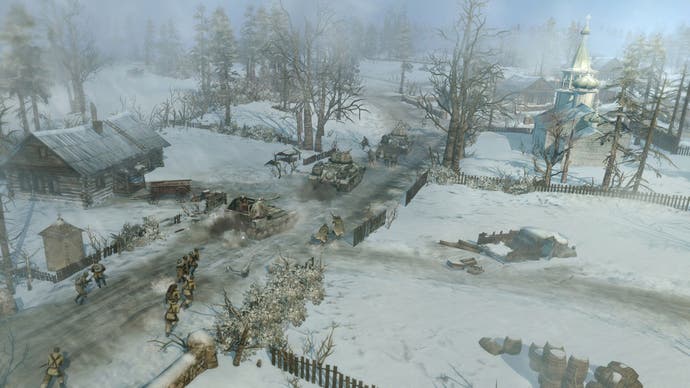
It wasn't long before representatives from Sega showed up at Relic's front door. They introduced themselves and began discussing the studio and the direction of the game.
"There was a process of a month or six weeks where we were trying to get integrated and they were trying to see where we were and get a good sense of the game and the progress and what we wanted to finish," Duffy says. Sega liked what it saw, then did something that delighted Company of Heroes 2's developers: it pumped more money into development and delayed the game to June.
"We were able to take stock, basically do an analysis of everything, look at the whole game holistically," Duffy says.
"We looked at some areas we wanted to improve on. A lot of it is small things. There's a layer, I like to call it 'cumulative subtlety', in Company of Heroes. Animations and audio and visual feedback - it's getting all those little things buttoned up and tightened up. We had an opportunity to get down to that layer. Let's improve that animation. Let's tweak this effect. That brings the level of polish up in the game dramatically.
"Then we were able to look at some features we had by necessity had to cut. We were going to look at them post-release. Now we can get in better server arbitration, authentication and security for progression. That allows us to build a roadmap for server features for the future.
"Ultimately, we were able to run a couple more betas. We're in live beta now. We're getting lots of feedback and telemetry. We're going to have one more, I hope, before we ship, to test our server features in a live environment.
"All that stuff adds up. It's an extra 90 plus days of bug fixing and polish and everybody pushing hard to complete pieces of the game. We were in good shape, but needed to be in great shape really."
We were in good shape, but needed to be in great shape really.
Assuming the sky doesn't fall in and Company of Heroes 2's launch goes as planned, Sega's purchase of the studio marks a happy ending to what's been a tumultuous time for the studio.
Duffy is delighted, of course, but he maintains that he had faith all along that Company of Heroes 2 and Relic would have survived - and thrived - even if Sega hadn't stepped in to save the day.
"We'll get the game out we wanted to get out. Had THQ managed to survive under their new investors, I have a really positive feeling the same conversations would have taken place. We would have had some breathing room to go, okay, we're not tied to that quarter. That quarterly release schedule is challenging for developers, and I think for publishers, too. An extra month or two here and there can make such a difference for a game's perceived quality. It gives us just a little bit more of room.
"Everybody, from Sega on down, in marketing and PR, and all of the groups that are needed to support a game's release, all those people have to jump in. That time to get the game finished, QA and marketing, is short for everybody. But it keeps the intensity up. It's exciting."
---
Now, with Relic's wellbeing secured and Company of Hereos 2 in open beta, Duffy can afford a moment to think about the future. While Duffy and Lee were in London to show the game to press they popped along to see their new real-time strategy brethren at Creative Assembly in Horsham, West Sussex, home of the Total War series, among others. Now Sega has two top-class RTS developers at its disposal, and the Total War, Company of Heroes and fantasy Warhammer IP under lock and key. It's an exciting time for PC gamers.
"It's never too early," Duffy says on whether plans have been made for Relic's next game. "The necessity of development is, we don't work up to the end day on this and just stop and start on something else. We've got to start those plans weeks ahead. Months ahead in some cases.
"So while we're working on Company of Heroes 2, we're also thinking about what we want to do continuing forward in the franchise." Whatever it ends up being, Relic will enjoy the comfort of knowing its publisher isn't going away any time soon.
